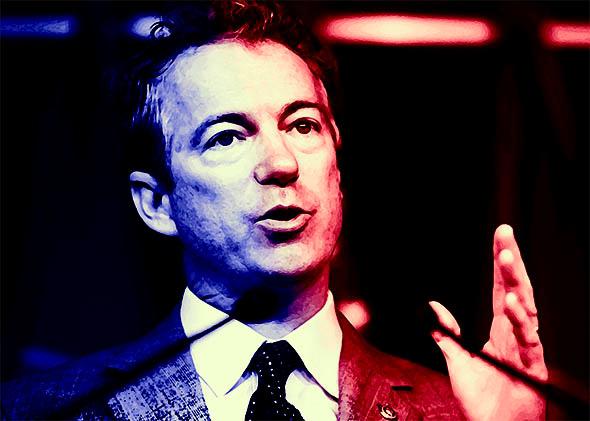Rand Paul is betting on the hope that people have not lost hope in change. Announcing his candidacy for the presidency Tuesday, the first-term senator outlined an agenda for change far more revolutionary than then-Sen. Barack Obama did in the 2008 race, but one that is based on an identical strategy. Paul promises to create a grassroots movement so big and powerful that it will swamp Washington and reconfigure it. “Washington is horribly broken. I fear it cannot be fixed from within,” Paul said in Louisville, Kentucky, on Tuesday. “We, the people, must rise up and demand action. Congress will never balance the budget unless you force them to do so.”
Paul is calling for deficit reduction at a faster pace than Paul Ryan or any Republican budget hawk has contemplated (or has been able to achieve) and a balanced budget amendment. He is also promising to completely overhaul the American system of government and to install systematic reforms like term limits.
The usual question a Republican candidate poses to himself is rigged: Can I be better than the dismal incumbent Barack Obama? But Paul is basing his candidacy on the idea that he can best the president at something Obama was already pretty good at. Even Obama’s critics say he was pretty good at rallying the public. Remember those gargantuan rallies and crowds of 2008? Barack Obama is the first president in more than five decades to win at least 51 percent of the national popular vote twice.
Obama could not translate his success at building a movement into success at building a sustainable governing force. On gun control measures for example, where polls showed he had the support of 90 percent of the country for items like background checks, he couldn’t get Congress to budge.
Most candidates make the case that they can win a governing coalition and that they have the skills to forge compromise or work the legislature or do whatever else is necessary to make the system work. Paul’s candidacy is based on the idea that he can create a coalition that can get him elected and then keep that coalition humming so that it makes government hop to its will.
That’s a big challenge. An ancillary challenge is convincing voters he can pull it off. Haven’t the Obama years cured people of belief in gargantuan change of this sort? Also: Do people want that much change? Life is pretty unpredictable and fast-moving. Do they want the kind of steady diet of disruption that Paul is promising?
Paul also faces Obama’s balancing act on foreign policy: how to promise a smaller, more humble foreign policy without looking too dovish to protect Americans fearful of Islamic fanatics. Unlike Obama though, Paul is facing headwinds. Obama put his primary opponents who had voted for the Iraq war on the defensive. Now Paul is the one on the defensive, facing charges of isolationism in a party where all the other candidates are competing to show who will have the most muscular response to foreign policy challenges. In his announcement, Paul wrapped himself in Reagan’s call for “peace through strength” and tried to exorcise the more isolationist rhetoric he threw around when he was a surrogate for his father and that he resorts to sometimes when he’s on the stump even now. In New Hampshire in January, he said, “In Washington, there is not a war anywhere where they don’t think there should be boots on the ground.”
Paul is running as the Republican who can be trusted always to default to liberty in a pinch. He has a track record to support that. On foreign policy however, he is arguing for nuance and balance. Necessary qualities perhaps, but on domestic affairs Paul’s candidacy encourages people to be suspicious of those who preach nuance and balance. This might muddle the message. If you’re creating a revolution that will change the fundamental nature of government, people need bright distinctions they can rally around or they’ll get confused and support other candidates or lose their motivation for your one true solution. After all, Paul’s not just running to win on Election Day. He’s building a movement for change.
